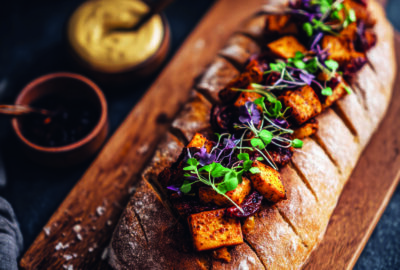A growing number of food halls are opening up across the UK and Ireland, influencing the way consumers dine out. The trend is also on the rise further afield into Europe and beyond.
Food Halls
Food halls help to broaden and promote new cuisines and street food concepts. Depending on their location, it can become an important local community hub. One of the main attractions for consumers is the wide choice of cuisine available, as well as entertainment and events. It’s a more informal dining experience and less expensive than going to a restaurant. In many cases, ordering can be done through an app or QR code which cuts queuing time.
Food halls include Mackie Mayor in Manchester, Eataly in London, Duke Street Market in Liverpool and Bonnie & Wild in Edinburgh. There are many more in the pipeline such as White Cloth Hall in Leeds being transformed into a new food and drink hall.
St George’s Market
St George’s Market in Belfast, Northern Ireland, must be one of the oldest food halls. Built during the 19th century, it is open every Friday, Saturday and Sunday, with different attractions on each day. On Fridays known as “Variety Day”, there are about 200 market stalls selling local produce, including Ireland’s leading retail fish market. The Belfast Bap Company is well-known for its signature ‘Belfast Bap’ – an entire Irish breakfast packed into a bread roll. Or there’s Check Out My Buns, selling vegan and gluten free cakes, buns and biscuits; Curry Sauce NI with its gluten free curry sauces; El Toro Grill with gourmet burgers and burritos; Tapitas with paella and tapas; The Crepe Markets with savoury and sweet crepes and Dezurts, offering warm puddings with custard, traybakes and cakes. On Saturday there’s a food and craft market, where customers can dine and shop while listening to live music from local bands and solo artists. On Sunday there’s a City Food and Craft Market, with the emphasis on local arts and crafts, as well as live music.
Epsom Social Food Hall
Peter Farrell, a former chef and founder of Epsom Social Food Hall in Surrey, which opened two years ago, says, “Food halls are popular as they are informal, casual spaces where people don’t have to dress up and can enjoy a range of different food options without committing to a two or three course meal. A group of people can order what they like from various vendors, the food arrives, and they enjoy it together. It’s inexpensive when people are watching budgets. It’s important to have a range of events. We attract young families, so we put on events such as parents and baby quizzes, cartoons and a family trivia quiz.”
Epsom Social Food Hall stages regular weekly events such as an open mic night, live music, charity events, talks and giant board games. It is also available for customers to hire for private events such as birthday parties and bar mitzvahs.
When Peter was planning what food options to offer in the food hall, market research revealed the most popular items were pizzas, fish and chips, Asian cuisine and burgers.
Epsom Social Food Hall runs its own food stalls as Peter wants to develop and operate the hall’s own brands. “We want to achieve and maintain control over standards and service – the easiest way to do this is to develop our own,” he says. “We decided to do the classics – burgers, fish and chips, pizzas, but make them high quality.”
The ‘Napo’ street food concept serves traditional high quality Neapolitan pizzas, using traditional Biga dough for the base, which brings the flavour of Naples to Epsom. “I was in Naples two years ago and the pizzas blew me away,” he says. Napo also serves Angioletti alla Nutella – fried sweet pizza dough covered with Nutella. Also on the menu is pizza sandwiches – pizza dough shaped like a panini baked in the oven then sliced in half with various fillings.
Pete’s Fish & Chips is an upmarket take on the British classic, using sustainably sourced fish, a special beer batter using Epsom Social branded beer and hand cut chips. “We make all our own sauces,” says Peter.
Spark Food Hall
Food halls can also revitalise areas, as in the case of Spark Food Hall in York, where the project was inspired by a vision to create a vibrant destination in a forgotten part of the city. Spark is a creative community space bringing together an array of independent businesses. These include food and drink vendors, as well as a holistic therapy studio, hair and beauty salon, a flexible co-working hub and a shared studio for resident artists.
Tom McKenzie, co-founder and managing director, says, “Our venue showcases local vendors, that are typically small or early-stage businesses, which gives people the chance to support and discover new culinary talent.”
Currently, Spark’s food offering includes Vovo Cantina’s Brazilian inspired grill kitchen, Knori Southeast Pan Asian street food, Sarras Indian Gujarai street food, Herbivorous modern vegan comfort food and Tiro Sicilian street food.
Chef Jack Jenner, founder of Baby Boy’s Burgers, has been trading at Spark in York for six months, selling classic burgers with a twist. He says, “We use fresh local produce from Yorkshire and make our own patties, sauces and pickles inhouse to our own recipes.” The best seller is the classic burger in a pattie with lettuce, cheese with dill and garlic pickles. A vegan burger is available – a portobello mushroom marinated in a Mexican style sauce. He says, “One of the best aspects of trading here is the sense of community working in the food hall – we’re like a big family looking out for each other. You’re working alongside other business owners so there’s always someone you can ask for advice. As a new business, the food hall offers stability and you also benefit from the marketing team promoting the venue and from the existing base of regular customers. That’s a massive advantage. I used to work in restaurants and there’s been a decline in the higher cost-per-head outlets. Food halls offer people quick cheap street food and entertainment.”
For a street vendor with a new concept, taking a stall in a food hall gives them an opportunity to test the idea in an internal space. There are many advantages for vendors such as reduced rental, flexibility and shared utilities. Tom from Spark says, “It’s a great chance to test an idea, at a much lower start-up than bricks and mortar premises, but it’s also the chance to be part of a collaborative community.”
With the changing high street and the popularity of the communal dining experience, it looks like food halls are here to stay, as more spring up over the country. Tom says, “As long as food halls can adjust to changing consumer preferences, adopt sustainable practices and offer innovative concepts, they will continue to thrive. Perhaps bizarrely, it’s not always just about the food. Like any hospitality offer, it has to grow and evolve with what people need.”
Street Food Trends
The rise of food halls has also accelerated new concepts in street food, mainly driven by social media.
- After becoming a TikTok sensation, Ben Newman, known as Spudman in Tamworth, has seen customers queuing for up to three hours outside his takeaway van for his jacket potatoes with various fillings such as chicken curry, tuna mayo or cheese and beans. He can sell around 1,500 a day priced between £4 and £5.
- Humble Crumble at London’s Borough Market, Old Spitalfields and Camden Market has been successful after raising their profile on TikTok, described as the world’s first crumble bakery. It serves crumbles with a variety of sumptuous toppings.
- Tom from Spark says, “Trends are interesting – fads come and go in minutes these days with TikTok and Instagram. Personally, I like the trend of people focusing on something classic and reimagining that for a modern audience. A really good pie, a classic butty done very well. I’m seeing more proper bagel spots and that ticks all the boxes for me.”



